Topic: BW - Qld - 1QMI
1st QMI
1st Queensland Mounted Infantry
Embarkation
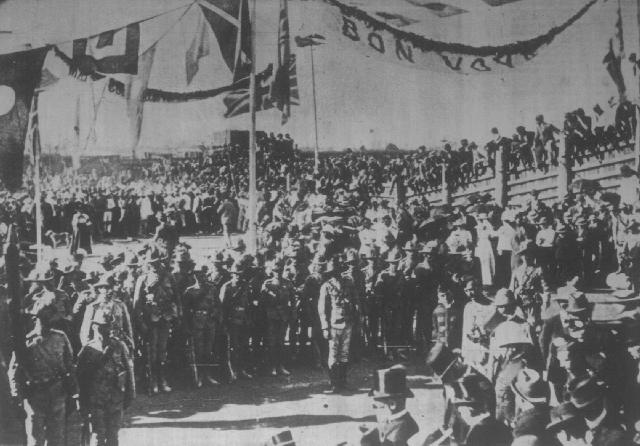
[From: The Queenslander, 11 November 1899, p. 956.]
The following description of the departure by the 1st Queensland Mounted Infantry at Pinkenbar Wharf, 4 pm, Wednesday 1 November 1899 was carried by the Brisbane Courier, 2 November 1899, p. 5:
DEPARTURE OF THE TROOPS.
AN IMMENSE ASSEMBLAGE.
INTENSE ENTHUSIASM.
A SPLENDID DEMONSTRATION.
TROOPS ADDRESSED BY THE LIEUTENANT-GOVERNOR.
MESSAGE FROM HER MAJESTY
TELEGRAMS FROM SIR E NORMAN AND LORD LAMINGTON.
When the history of Queensland comes to be written, the event of yesterday will stand out prominently as one of the most patriotic movements ever made by one of Britannia's colonies. It is unnecessary to outline even briefly the circumstances which led up to the Queensland Government offering the Imperial authorities the services of a volunteer force, nor is it needful to point out how spontaneous was the response on the part of our soldier citizens. It has been proved beyond doubt that not only do we live under one flag, but that we have one destiny and one aim, and when the present struggle in South Africa is finished, and the British flag reigns supreme there, one of the happiest episodes of the whole campaign - the silver lining lighting up the sombre black of the dark war cloud - will be the confidence in and loyalty to the Throne and the noble woman who occupies it shown by not merely one but all the colonies.
It has been said that history, invariably repeats itself, and such most assuredly is the case. Yesterday was a counterpart in every way of that memorable day In 1884 when the Now South Wales troops left Sydney Harbour to go to the assistance of the Mother-country in the Soudan. It was then that Great Britain first recognised that in her colonies she had something more than children to be suckled and spoonfed. She, realised that in her dependencies she had allies ready and willing to step in to her assistance in the time of extremity and need, and, if needs be, sacrifice even life itself in defending the honour of the Empire. The feeling of patriotism which prompted the Now South Wales Government to offer troops during the earlier Soudan War has, however, grown in intensity, and as a result we find at the present time one united cry going up from the whole of Britain's sons, and one can readily imagine that as the other nations of the world stand gazing at the scene, they cannot but be impressed with the fact that Britain's solidarity is something which in the future will carry more weight than even her "first line of defence" - her navy.
Yesterday was a perfect day. A few white clouds were floating about; but otherwise the sky was a brilliant blue, and a soft breeze from the north-east tempered the heat, and made the weather faultless. It was fitting that Nature should wear nothing in the shape of a frown on such an occasion, and if there is anything in omens, either good or bad, the smiling manner in which Nature bade farewell to the contingent should augur well for their career in South Africa.
As early as 11 o'clock in the morning people began to assemble in the vicinity of the wharf, and as each train arrived, the numbers rapidly swelled. By 2 o'clock an immense crowd had congregated, and every point of vantage along the line, and on the river bank, was taxed to the utmost. A number of refreshment booths had been erected on the vacant ground at the side of the railway station, and as in addition to these there were fruit-hawkers almost without number, the wants of the general public were fairly well catered for. The Brisbane agents of the Federal Steamship Navigation Company (Messrs. Birt and Co., Limited), had a special marquee erected on the space between the wharf and the cattle-yards, for the entertainment of the many friends, the managing director (Mr. Hood) and his hospitable wife had invited down to witness the departure of the troops.
Shortly after 3 p.m. the troops arrived, headed by the Headquarters and the Volunteer bands and a number of pipers. Their appearance was the signal for a spontaneous outburst of enthusiasm. The cheering, which commenced on the outer fringe of the crowd - the point where the troops arrived - travelled like wildfire through the vast assemblage, until every voice had joined in the grand chorus of enthusiasm. The scene as viewed from the deck of the Cornwall was a picturesque one, and full of animation.
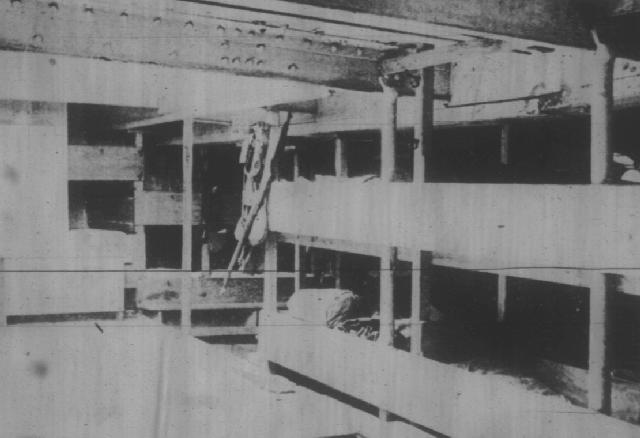
[From: The Queenslander, 11 November 1899, p. 957.]
A NOTABLE PICTURE.
The level ground stretching away on cither side of the wharf and extending back to the line was one huge sea of faces, broken here and there with sunshades as varied in colour as was Joseph's coat. Not a spot was left unoccupied. The youngsters, determined not to be outstripped by their elders, clambered up on to a high pile driving derrick which stood close to the bank some distance from the wharf, on to the loading race, and on to the tops of the railway carriages and the various sheds standing in the railway enclosure. Farther away, on the opposite side of the line, was a heterogenous collection of vehicles, ranging from the shakiest of carts and other ramshackles to the smart Victorias and waggonettes of the elite. Additional colour was lent to the scene by the gay bunting which floated over the wharf, and the bright garlands bearing appropriate mottoes - which had been stretched with artistic carelessness between the poles erected to carry the bunting. The hills stretching away in the distance made an extremely effective background to the picture - a picture which will last long in the memories of those who had the privilege of gazing on it. On the river the same animation existed. Along the bank, both above and below the wharf, were moored numberless boats of all descriptions, whilst steaming about in the stream opposite the Cornwall, profusely decorated with flags, were almost all the small steamers of the port. The larger steamers, including the Otter, Lucinda, Garnet, Pippo, Grazier, Albatross, Minar, und one or two of the Government steam barges were completely packed, whilst many of the smaller craft seemed almost dangerously crowded.

[From: The Queenslander, 11 November 1899, p. 955.]
THE TROOPS ON THE WHARF.
The bands which marched on to the wharf playing a lively patriotic tune were followed closely by the troops, headed by their commander. Colonel Ricardo. The dismounting of this officer was the signal for another display of enthusiasm. Amidst the cheering the men frantically waved their hats, while the fair sex joined in the enthusiasm with the aid of handkerchiefs and sunshades The first of the contingent to march on to the wharf was the detachment of the Queensland Royal Australian Artillery (the machine-gun section), and then came the A and B Companies of the Mounted Infantry, under Captain Chauvel and Captain Pinnock respectively. The men were lined up on the wharf four deep, and in their full uniform they looked a particularly fine lot of men. In front, in the centre of the line, were three officers, the centre one of whom, Lieutenant Adie, held the flag which had been presented to the contingent by some of Queensland's patriotic womenfolk. In forcing their way through the crowd on to the wharf, the troops became rather disorganised, but by "doubling" they quickly resumed their places, a fact which spoke volumes to the training which the men have received since the camp was formed at Meeandah.
ARRIVAL OF THE LIEUTENANT GOVERNOR.
About a quarter to 4 his Excellency the Lieutenant-Governor (Sir S. W. Griffith) arrived, accompanied by Sir Edward Richardson, Sir H. M. Nelson (President of the Legislative Council), the Hons, J, R, Dickson (Premier), F. T. Brentnall, M.L.C., A. Rutledge (Attorney-General), R. Philp (Treasurer), J. F. G. Foxton (Home Secretary), Mr. H. S. Dutton, and a number of others. His Excellency was received by the Commandant (General Gunter), and was escorted to a position on the wharf just opposite the men. His appearance on the wharf was tho occasion for further cheering, and it was some time before the enthusiasm had sufficiently exhausted itself to allow of his addressing the men.
SIR S. W. GRIFFITH'S ADDRESS.
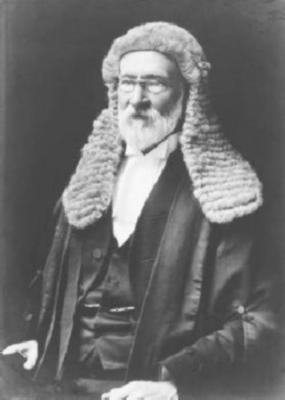
[From: nla.pic-an23398523]
Comparative quiet having been restored, his Excellency, facing the men, said: "Colonel Ricardo, officers, non-commissioned officers, and men of the Queensland contingent for South Africa, It is my privilege to be here as the representative of her Majesty to say a word or two to you before you embark on this ship to take a part in the wars of the Empire to which we all belong. First of all, I have a message from her Majesty herself. After thanking the people of her colonies for the aid they are willing to give her in South Africa, she concludes with a message to you. She wishes you godspeed and a safe return. (Applause.) Next, I have a message from his Excellency Lord Lamington, sent at the moment of his leaving Australian shores at Albany. He asks me to extend to you his best wishes and earnest hope for your success in South Africa. I have also a message from the late Governor, Sir Henry Norman, from London. The message reads: "Please convey to the Queensland troops on embarkation hearty congratulations and good wishes from Lady Norman and myself." (Applause and cheers.) I will now add a few words for myself. You know that as soon as you embark on the Cornwall you will be, in effect, soldiers of her Majesty's regular army. (Applause.) Her Majesty has been pleased to instruct that from embarkation you are to be deemed to be serving with her forces. You will be subject to all the rules and regulations Of her Majesty's army. It is not necessary for me to say anything about courage or duty. Courage is a quality, not a duty, and I am satisfied that, as Queenslander, you all have it but the first duty of the soldier is obedience. It is not yours to reason why, not yours to make reply, but to obey. It is no concern of a soldier what may be the nature of the quarrel for which he is fighting; but for all that it is true that "thrice is he armed that hath his quarrel just." You are all volunteers, going of your own free will to take a part in the wars of the Empire, and you have the satisfaction of knowing - and it is great satisfaction - that the war in which you are going to take part is one that is necessary for the preservation and maintenance of the Empire. For reasons that are only too apparent to those familiar with the facts, it has become necessary for the British Government to declare a state of war in South Africa. The alternative would be to have allowed the prestige of the British Empire in that portion of her Majesty's dominion to fall and what the consequence of that would be, no one could tell. You are going to take part in what I believe will be an arduous work. I am satisfied you will do your duty. You know that you represent Queensland. You carry in your hands the honour of Queensland and of Queenslanders, and I am satisfied that Queensland will not suffer at your hands. (Applause.) You will have with you the best wishes of all the people in this colony, and not only of this colony, but of the whole of Australia, and the whole of the British Empire. Remember that you will be supported by all that absent men can do. You will have our prayers and good wishes for your success in the field and your safe return. I conclude. Colonel Ricardo, officers, non-commissioned officers, and men, in the words of her Majesty, in wishing you godspeed and a safe return. (Applause and cheers.)
Cheers were then given for the Lieutenant Governor, the contingent, and Colonel Ricardo.
THE TROOPS GOING ON BOARD.
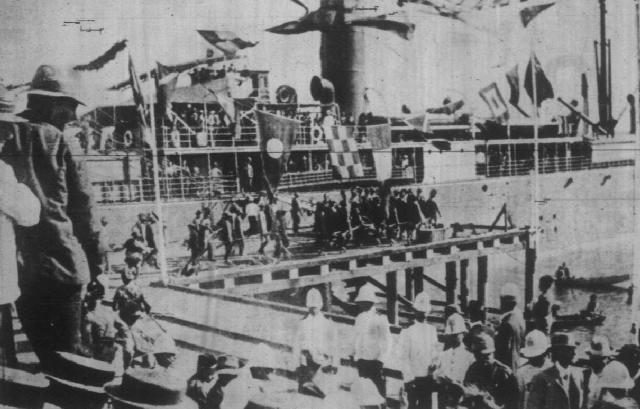
[From: The Queenslander, 11 November 1899, p. 956.]
Immediately upon the conclusion of the address. General Gunter reported to his Excellency that the men were ready, and Mr Samuel Griffith having given the orders to proceed, the work of embarkation was commenced. As the first men mounted the gangway leading up to tho vessel the Headquarters Band struck up "Soldiers of tho Queen," and, the men taking up the chorus another wave of enthusiasm passed over the vast crowd of spectators. It was not long before the whole of the men had embarked At about half-past 4, the gangway leading from the wharf to the ship was lowered, and the springs having been let go, and the orders of Pilot Cloherty who had been selected for the responsible work of piloting the vessel to sea, the ship steamed gradually out into the stream, and anchored some little distance below the wharf. When it was seen that the vessel was on the move the crowd were spurred on to make one more and final effort, with the result that the cheering and shouting were almost deafening. When the din, for the cheering could be called by no other name, had subsided somewhat, the band struck up "Auld Lang Syne," and as the transport steamed slowly away from the wharf, not a few eyes were moist, and more than one, no doubt, was reminded of the words of the Irish poet -
Home to your chambers - home, and pray
For the bright coming of that day
When blessed by Heaven, the Cross shall sweep
The Crescent from the Aegean deep,
And your brave warriors - hastening home
Shall bring such glories in their track
As shall, for many an age to come,
Shed glory round their name and home.
COLONEL RICARDO'S FAREWELL MESSAGE.
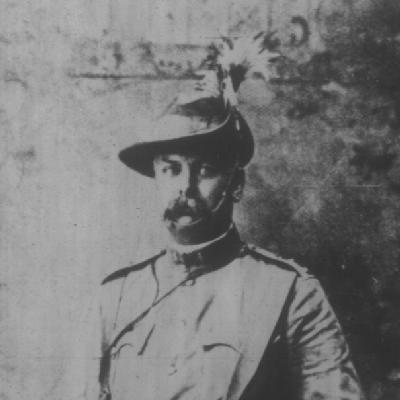
[From: The Queenslander, 28 October 1899, p. 857.]
Just prior to the departure of the Cornwall from the wharf, Colonel Ricardo gave to a representative of the "Courier," who was wishing him godspeed, a message for all the wellwishers of the contingent. "Tell them," he said, "that I regret sincerely that I have not had time to reply to the many communications I have received. I am deeply conscious of the earnestness with which these messages of godspeed have been sent, and I sincerely trust that success will attend us, and that we will achieve all the hopes of our comrades."
Some diversion was caused by a number of the men, five in all, who had been doing guard duty at the camp, turning up when the vessel was some fifty or sixty yards from the wharf. A small boat was secured, however, and it was not long before they had joined their comrades on the Cornwall.
The transport steamer, which, as has already been stated, anchored in the stream some distance below the wharf, remained in the river all night; but it is expected that everything will be in readiness for her to put to sea this morning. The vessel, which left the wharf quite three hours before high water, was drawing 23ft. 2 in. aft, and 22ft. 8 in. forward.
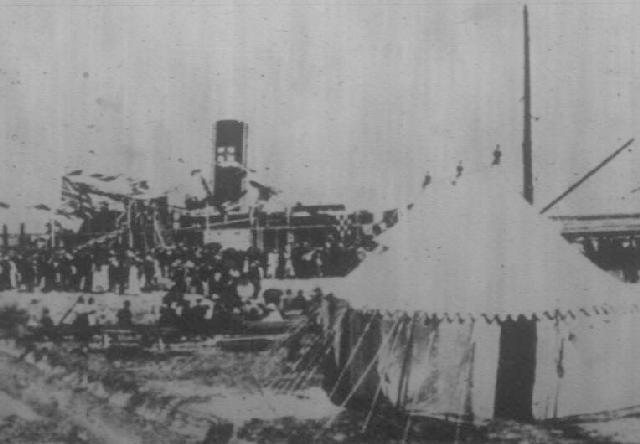
[From: The Queenslander, 11 November 1899, p. 955.]
NOTES.
Major Browne did not join the vessel yesterday. He leaves by the mail train this morning for Sydney, where he will embark on the Cornwall.
The tents at the camp at Meeandah were left, when the troops marched out yesterday, to be taken down by the men of the Permanent Artillery, and returned to the store.
The members of the contingent have been remarkably well supplied with clothes, boots, &c. In fact, one men was heard to say yesterday that they had received every conceivable article necessary.
The enormous crowd at Pinkenba was well managed by a large squad of police, whose duties were arduous The absence of accident speaks well for their work The police were personally superintended by the Commissioner (Mr Parry-Okeden), who had with him Chief Inspector Stuart, Inspector Urquhart, Sub-Inspectors White and Galbraith
THOSE RIFLES
The Commandant was asked last night if he desired to make any statement in connection with the remarks in the House concerning the rifles supplied to the contingent.
"Oh, no," he replied, "the Chief Secretary will have it." It may be stated that it was mentioned at the camp at Meeandah yesterday that, on arrival at South Africa, the men would be supplied with magazine rifles; but the truth of the statement could not be established.
Further Reading:
1st Queensland Mounted Infantry
1st Queensland Mounted Infantry, Roll of Honour
Battles where Australians fought, 1899-1920
Citation: 1st Queensland Mounted Infantry, Embarkation



